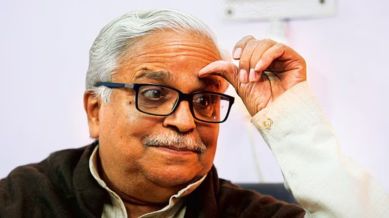Stay updated with the latest - Click here to follow us on Instagram
In row over RSS leader Bhaiyyaji Joshi’s remark, Shiv Sena (UBT) sees chance to revive ‘Marathi Manoos’ plank
The BJP’s estranged alliance partner, the Shiv Sena (UBT), is at a crossroads, looking for an agenda to refurbish its image and gain lost ground in Mumbai.

Senior RSS leader Bhaiyyaji (Suresh) Joshi’s recent remark on Marathi seems to have given a fresh impetus to the Shiv Sena (UBT). Emboldened by the controversy following the remark, the Uddhav Thackeray-led party, which has found itself on the back foot after the Maha Vikas Aghadi’s drubbing in the Maharashtra Assembly elections last year, may revert to reasserting ‘Marathi Asmita’ (Marathi pride) to resurrect its weakened base in Mumbai.
Joshi’s remark that “Mumbai does not have one language… and any individual coming to Mumbai may not necessarily learn Marathi” – he later backtracked and said he was misunderstood – could not have come at a better time for the Shiv Sena (UBT).
monthly limit of free stories.
with an Express account.
The incident comes at a time when the party is in a do-or-die multi-cornered battle in the forthcoming Brihanmumbai Municipal Corporation (BMC) elections this year. With the BJP getting stronger by the day, estranged alliance partner Shiv Sena (UBT) finds itself at the crossroads, looking for an agenda to refurbish its image and gain lost ground.
At 35.96 per cent, the Marathi-speaking population in Mumbai is the largest segment in the city as compared to the two other dominant communities, North Indians (up to 20 per cent) and Gujaratis (up to 17 per cent).
When the late Bal Thackeray founded the Shiv Sena on June 19, 1966, it had taken a pledge to fight for the rights of the ‘Marathi Manoos’ or the sons of the soil. He had also proclaimed that Shiv Sena would be 80 per cent devoted to social work and 20 per cent to politics. This distinction was often reiterated to remind Shiv Sena members of their ultimate goal. Over the decades, however, electoral politics became the mainstay of the party.
While the Shiv Sena (UBT) still maintains its commitment to the sons of the soil as an integral part of the organisation, its ambition to expand reflected a shift in its strategy as it tried to mend fences with the North Indian community by shedding its anti-migrant campaign.
In successive elections held in the late 1990s, the Shiv Sena tried to make a concerted attempt to woo North Indian and Gujarati communities in Mumbai, a move that was often seen as a dilution of its ‘Marathi Manoos’ agenda.
Yet, for almost four decades, when the undivided Shiv Sena and the BJP were alliance partners, it was given to understand that Shiv Sena’s regional party appeal would ensure their Marathi vote bank. And the BJP, with its pan-Indian image, would hold appeal amongst the North Indians and Gujaratis. The formula worked for the saffron alliance as they came to power for the first time in Maharashtra in 1995. A strong Hindutva agenda also helped them ride to power.
For the last 15 years, the Shiv Sena’s emotive ‘sons of the soil’ plank has been overtaken by the ‘Modi factor’. Not surprisingly, after its split, Thackeray’s party has been experimenting with multiple issues to retain their stronghold. The split in June 2022 was a body blow. In the 2024 Assembly elections, the party only won 20 seats; in the Lok Sabha, just nine.
This could be why Joshi’s flip-flop on Marathi and Mumbai saw Thackeray cashing in on the moment to reiterate its commitment to the city’s ‘sons of the soil’ – a voter base that will also be wooed by Deputy Chief Minister Eknath Shinde and his Shiv Sena.
“The BJP has no regard for the Marathi manoos because it knows he is not going to vote for them. This is a sadist mentality that has come to the fore. This is a ploy to break Mumbai,” Thackeray said.
“The BJP wants to undermine Marathis to capture the state. So, it is not just a Marathi vs non-Marathi issue, but also Maratha vs non-Marathas and the formula to capture the state by them (BJP),” he alleged, daring the BJP to make such statements in Gujarat, Tamil Nadu, Karnataka, Kerala and West Bengal and return safely.
While admitting that Joshi’s remark was unwarranted, a BJP leader explained that his statement “was misconstrued”.
The BJP has already come under attack for allegedly giving Mumbai and Maharashtra a step motherly treatment when it comes to development projects with the Vedanta-Foxconn, bulk drugs park, and Tata Airbus projects being shifted to Gujarat.
A senior BJP minister denied the charges, citing the Coastal Road, Bandra Sea Link, and Metro projects as examples. “Projects worth Rs 2 lakh crore are going on in different phases. Some have been completed and some are ongoing. Ultimately, you have to win the trust of the people through work, not just raising slogans on Marathi and Mumbai,” he added.
Looking to put an end to the controversy, Chief Minister Devendra Fadnavis had said, “Marathi is the language of Mumbai…Maharashtra. Everyone who comes here should learn and respect it.”